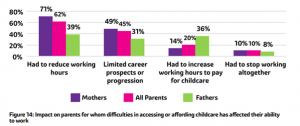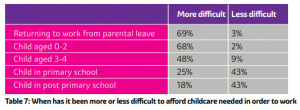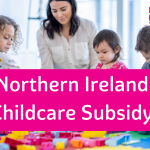Latest Women in Northern Ireland Labour Force statistics published to coincide with International Women’s Day 2022
The latest Women in Northern Ireland 2020/21 statistics have been published by the Northern Ireland Statistics and Research Agency, setting out the different labour market experiences of women and men in Northern Ireland. The release coincides with International Women’s Day 2022, which is a global day celebrating the achievements of women. The theme for 2022 is ‘breaking the bias’.
Key findings from the report include:
- The employment rate for women has been consistently lower than for men over the past 10 years. In particular, fewer women are self-employed than men.
- Women are less likely to work full-time than men. 60% of employed women with dependent children work full time, compared to 94% of employed men with dependent children.
- On average, women earn less than men. In 2021 women earned 5.7% less than men, however the gap has decreased over the past 20 years.
- Women are still more likely to be classified as economically inactive than men, and more likely to attribute this to ‘looking after family and home’ (28%) than men (6%).
Why does this matter?
These statistics have important implications for policies in relation to issues like childcare, which clearly impacts on female participation in the workforce. For example, in relation to economic inactivity, a significant number of people with caring responsibilities, disproportionately women, are excluded from the job market in Northern Ireland. These are individuals who would like to work, but factors such as an inability to access or afford they childcare they would need prevent them from doing so. It is important to explore why this is the case, to ensure that our local economy can benefit from their skills and experience.
In our most recent Northern Ireland Childcare Survey, we found that difficulties in accessing or affording childcare impacted on the ability of parents to work. This affected 44% of the parents who participated in the research, rising to 58% of mothers, compared to 27% of fathers.
This has impacted on those parents in a range of ways, with mothers more likely to have had to reduce their hours of work, experience limited career prospects or progression, or to have had to stop working altogether.

Through our research we found that the time when a parent is most likely to struggle to afford the childcare they need is when they are seeking to return to work from parental leave, and for the first two years of their child’s life. This is when typically full time childcare will be required. If we are to support parents to enter into, or stay in the workforce, and help to give children the best start during their formative first 1,000 days, addressing this needs to be a priority for the Department of Education as they work on the development of a new Childcare Strategy for Northern Ireland.

At a time when one of the biggest challenges facing organisations is recruitment and labour shortages, it is critical that we address infrastructural barriers that are preventing parents – particularly mothers – from entering, and remaining in, the workforce. This includes childcare.
How can we remove barriers to women getting into and progressing in work?
We need a childcare system that can promote economic participation and support families to get into and stay in work. This requires investment in an ambitious, fully funded Childcare Strategy that recognises childcare as part of our essential economic infrastructure.
An accessible, high quality, affordable childcare system is essential if we are to move towards an economy which supports everyone to thrive and enables all sectors – whether that is big business, small enterprise or the self-employed, and from retail and hospitality and tourism to IT, services and construction – to achieve their full potential.
Investment in childcare to support parents to work has wider economic benefits, not just for parents but for the economy as a whole. It was recently reported by the Centre for Progressive Policy that investment in childcare could increase the total annual income of working mothers in the UK by up to £10 billion, generating up to £28 billion in economic output per annum.
The Women’s Budget Group has estimated that investment in care – including in childcare – would produce 2.7 times as many jobs as an equivalent investment in construction, highlighting that this is an excellent way to stimulate employment. At a time when many employers, across a wide range of sectors, are struggling to recruit and retain staff, a key part of the solution is to ensure that parents are able to access and afford the childcare they need in order to work.
With work underway on a new Childcare Strategy for Northern Ireland we have a not to be missed opportunity for the Northern Ireland Executive to show their commitment to building back better, and creating a world-class childcare infrastructure – that supports parents to work, aids the wider economy and society and critically, invests in the social and educational development of our children – the benefits of which will be felt for generations to come.






